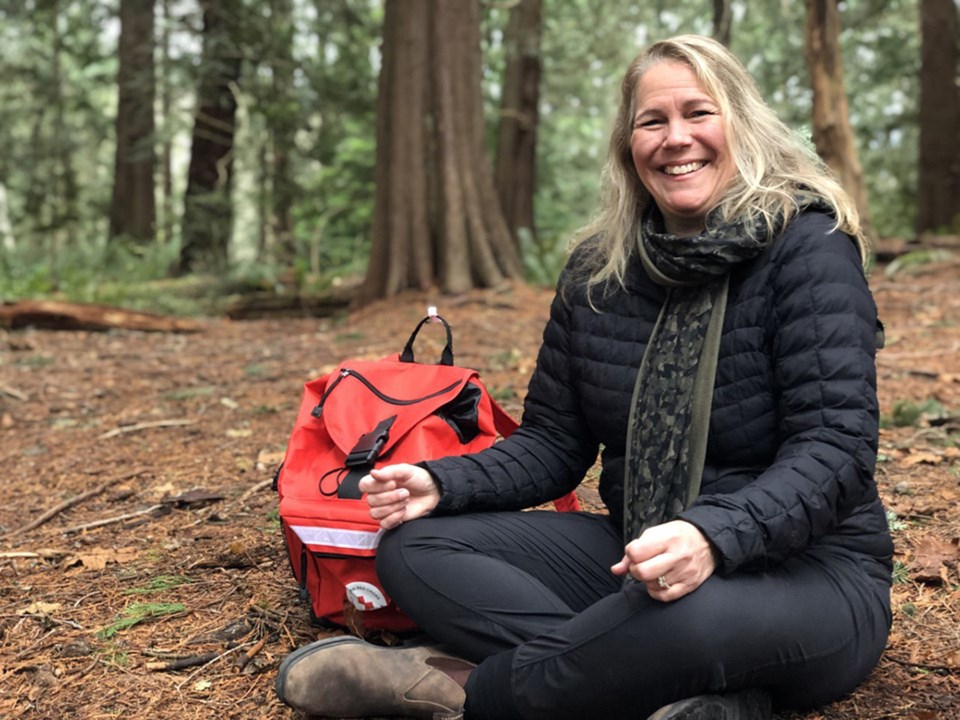Floods. Forest fires. The Big One (both earthquakes and heart attacks).
Amanda Ockeleon has stared down her anxieties about almost every natural disaster. But, instead of it making her more fearful about everything that could go wrong, thinking through all the what-ifs has actually made her calmer.
When so many things in life are out of her control, at least she knows she’s ready to act. She’s given her anxiety a constructive task.
“It’s just taking that one little step,” says the island’s former emergency preparedness coordinator. “When you know that your grab-and-go bag is by your front door, you feel like you could move on to the next step if the disaster did happen.”
Ockeleon was one of the first municipal employees to focus on emergency planning. It involved taking a lot of courses that taught her about all the eventualities that the island had to be ready for.
But it was when she watched The Impossible that she was able to see the issues through a more personal — and manageable — perspective.
The movie is about the Boxing Day tsunami that killed an estimated 230,000 people throughout the Indian Ocean. What intrigued her was people’s reaction as the traumatic situation unfolded cinematically. They thought about things she wouldn’t have considered: Where’s my cellphone so I can let my family know I’m safe? Where’s the nearest hospital?
It was as if she could chunk down her fears about what to do into more achievable goals. “I like that it made me prepared in a more friendly, or normal, way.”
Instead of imagining the terror of a flood or earthquake, she pictured herself camping in the forest. That’s what it would be like if she had to live off the grid with no access to anything other than what she had packed in. There’s no cellphone coverage, no fridge door to open when you’re hungry, no thermostat to turn up when you’re cold at night.
“You ask yourself, ‘What would I need?’ It makes the idea [of being without outside resources] a bit more friendly.
“The whole idea of a disaster is a bit much to take on and that’s probably why people don’t want to get on with being prepared for it. You don’t really want to go down that hole. It’s too much to take on.”
It can be overwhelming to imagine the panic of what would happen if the fires that devastated the interior or the floods that have more recently forced people from their homes in the valley were to happen on Bowen Island. Our brain’s fight, flight or freeze response gets triggered.
“It’s all it’s just too out there in a way, isn’t it,” Ockeleon says of why the message of being prepared has to be repeated even though people already know it’s the right thing to do. When something seems too big to be manageable, “people feel like ‘Let’s just leave it’ or ‘We’ll do it tomorrow.’ You just put it off. It’s like homework — do it later.
“But I think doing things to be prepared just feels better. It’s a bit of a relief. It’s controlling the out of control…. I feel I’ve done as much as I can. The rest would just be bad luck.”
Ockeleon is still very much involved in emergency preparedness on the island. She sells the grab-and-go kits people should have by their door in case they are told to immediately evacuate. She also teaches first-aid and CPR courses so that if you come across someone having a medical emergency, your training can kick in.
“If you’d never learned any of the stuff — which only takes a few hours — you’d just be standing there flapping your hands up and down rather than being able to think ‘Oh, wait, I know what to do here. Yeah, you go call 911. I’m going to stay here and check their ABCs.’ You actually have a plan and you can follow it rather than just the old hand wiggle….
“You could take action and that would just be so much better than standing there feeling like, ‘Oh, I should have done better.’”
That said, Ockeleon’s life is not without anxiety. She might not worry about what she’d do if there was a fire but she can still obsess over whether her headache is a sign of brain cancer. And, as organized as she is about coping with natural disaster, she says please don’t ask her to Marie Kondo her junk drawer.



